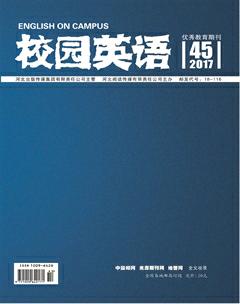InterpersonalFunctionPresentedinContractLawofPeople’sRepublicofChina
HeLixin+LiXuejiao
【Abstract】Modality is a tough question for analysis. Thus, the author attempts to investigate the modality system in the legal document Contract Law of P.R.C. The thesis aims to explore the main modal expressions in Contract Law, the most frequent modal expressions and the interpersonal functions that are presented by the modal expressions.
【Key words】modal expression; interpersonal function; Contract Law of P.R.C
INTRODUCTION
The thesis aims at investigating the main modal expressions in Contract Law and the interpersonal function in modality system. It appears to be a universal feature of legal style that the authors, together with translator disappear. Legal text has the features of objective, exact and plain both in linguistic context and form which always is written in a kind of frozen style. We can be confident to conclude that the modality system in discourse is the modality system in it on the whole.
I. Showing Solemnity and Accuracy
According to systemic-functional linguistics, the interpersonal function is a vital social function. In our daily life people communicate with each other in different social environment. We tell other people things for a definite purpose:we may want to influence their attitudes or behavior, or to get them to provide us with information and so on. Through the analysis of modal expressions we can find in Contract Law the frequency of modulation appears more often than modulization. Almost all the sentences in the Contract Law are declarative sentence. As legal language, Contract Law, its functions are instruction, imposing obligation and granting power, so the words expressing modulation play the dominant role in delivering the obligation and inclination. For example:
Where a person having no right to disposal of ..., the contract shall be valid.(Article 51)
In the above articles, the use of “shall” is quite precise, which functions as obligation, regulation and procedure that the party must obey. It also shows the character of solemnity.
II. Maintaining Social Order and Encouraging Transactions
As an important legal document, the Contract Law presents the features of maintaining social order which includes protecting the parties lawful rights and interests, maintaining transaction order and promoting the economy development. The parties can come to an agreement under the protecting of Contract Law which can prevent from unnecessary troubles occurred to contracting parties.endprint
A famous British lawyer Lord Nandfied has ever vividly said that most of the disputes in the world arise from words. From the sentence we can perceive the importance of legal practice. Contract Law is also regarded as a source of social security. It allocates the power between the parties in the legal form, which serves for people. In order to maintain social order and encourage transaction Contract Law not only takes justice into consideration but also stress on effectiveness.
III. Expressing Probability and Obligation
We have learned in modality that probability can be expressed by modal operators CAN, COULD, SHOULD, WILL, WOULD and MAY. After investigation, “MAY” appears 48 times in CL, which account for 57.14% (the total modal operator expression of probability is 84). We can easily observe that it is the highest frequency in the Contract Law. Some examples selected from Contract Law are shown:
An offer may be withdrawn... when the offer arrives.(Article 17)
The using of MAY in the above article illustrates that when the readers catch sight of the rule, they dont take the rule as enforcement. It just can satisfy the readers desire not to be forced. And the most important is it can flexibly make the readers have the sense of probability through the using of MAY.
CONCLUSION
As far as written language, when the discourse event is not the interaction between speaker and listener but the written product, we can modify the original interpersonal model, that is, it is modality not mood that should be the main ingredient of interpersonal meaning. As a legal written language, Contract Law has its own features and rules, which belongs to legislative language which refers to law, rule, treaty and regulations text recorded by language.
References:
[1]Halliday,M.A.K.2000.An Introduction to Functional Grammar.[M]Beijing:Foreign Language Teaching and Research Press.
[2]Perkins.1983.Modal Expressions In English.[M]London: Frances Printer.
[3]Vystrcilova,R.2000.Legal English[M]Acta Universitatis Palackianae Olomucensis,73,91-96.
[4]Chen Zhongcheng,PRC Civil Principle AAA The Comparative Analysis.
作者簡介:
何丽新(1979-),女,汉族,吉林洮南人,硕士,陆军装甲兵学院士官学校,讲师,外语教研室,研究方向:系统功能语言学,认知语言学。
李雪娇(1982-),女,吉林磐石人,硕士,吉林大学公共外语教育学院,讲师,研究方向:法语教学法。endprint

